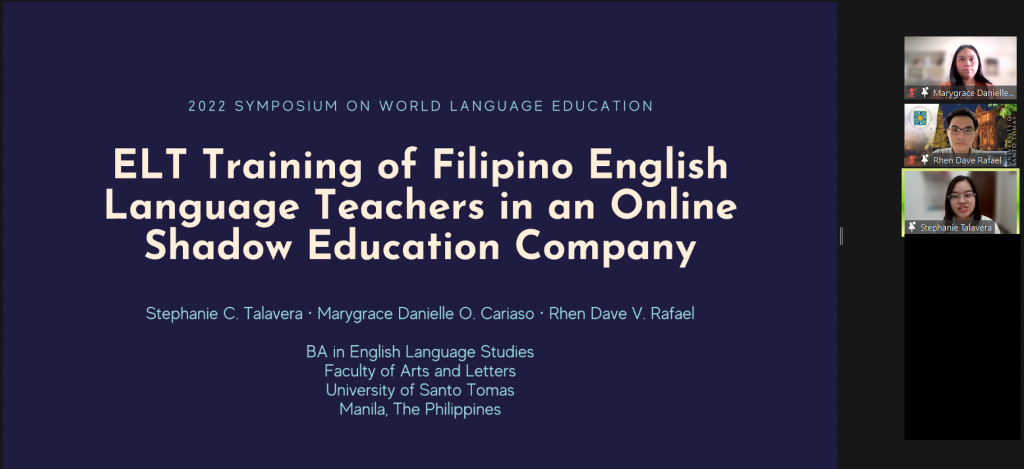Three students under the English Language Studies (ELS) program of the Faculty of Arts and Letters, Stephanie C. Talavera, Marygrace Danielle O. Cariaso, and Rhen Dave V. Rafael, presented their paper at the Symposium on World Language Education (SOWLE) 2022 on February 5, 2022.

This year’s three-day online symposium was hosted by the Graduate School of Translation, Interpretation, and Language Education at the Middlebury Institute of International Studies at Monterey, California, USA. It had the theme “Promoting Equity and Leadership in the Language Classroom.”
The group’s study, titled “ELT Training of Filipino English Language Teachers in an Online Shadow Education Company,” described the teacher training of Filipinos teaching English as a foreign language (EFL) in a Chinese company. They were able to highlight the company attitudes and requirements that reflected the notion of Unequal Englishes (UE).
The global spread of English led to the emergence of World Englishes (WE), or localized and indigenized varieties of English. There are many Englishes, but the social hierarchization of Englishes places ‘non-native’ English speakers and their Englishes at a disadvantage.
In English language teaching (ELT), a native-speakerism ideology is often instilled in which native speakers and their ‘standardized’ varieties of English are considered the models for English language education. Despite being linguistically and culturally diverse, ELT classrooms create and maintain the inequalities in WE.
Amid the preference for ‘native’ or ‘standardized’ varieties of English, ‘non-native’ English-speaking teachers (NNESTs) outnumber native English-speaking teachers (NESTs) during the hiring process. However, discrimination and devaluation toward NNESTs and ‘standardizing’ Englishes remain a concern in ELT. Many studies have attested that language learners and NNESTs prefer ‘standardized’ varieties of English.
Currently, there is a high demand for shadow education or private supplementary tutoring in East Asian countries, where Filipino EFL teachers are often hired.
In this context, Talavera and her co-authors investigated the ELT training of Filipino online EFL teachers in a Chinese company with the assumption that the company abides by native-speaker norms, which may affect the teachers’ beliefs on WE. They interviewed four Filipino online EFL teachers and a teacher trainer who are affiliated with China’s largest online English tutoring platform.
The findings indicate that teachers must complete self-paced ‘Teaching English to Speakers of Other Languages’ and Teaching English to Young Learners’ courses within 15 days. Afterward, they undergo an eight-step recruitment process that includes interviews, synchronous online technology and classroom management training, and mock classes with Filipino and Chinese English teacher trainers.
The training and teaching materials used in the company subscribe to American English (AmE) standards, yet only a ‘neutral’ accent is required. A ‘neutral’ accent is placed between ‘local’ Filipino and ‘native’ English accents, leaning toward an AmE accent. The company does not require Filipino EFL teachers to sound like native speakers. Still, the participants reported that a few Chinese trainers and clients expect them to sound like native American and British English speakers. Generally, the study found that the notion of Unequal Englishes in the industry can be interpreted as subtle and latent.
The Philippines has its own varieties of English. Studies often focus on the ‘standard’ or ‘educated’ variety of Philippine English, yet there are many sub-varieties across the archipelago. Filipino sociolinguist Dr. Isabel Pefianco Martin refers to Philippine Englishes as ‘Pinoylish’.
Talavera, Cariaso, and Rafael’s paper provided a preliminary description of Filipino EFL teachers’ training and teaching experiences in a virtual learning environment. In closing, they called for further research on online EFL teaching. Specifically, they stressed the need for a comparative study on the language policies of shadow education companies across Asia.




